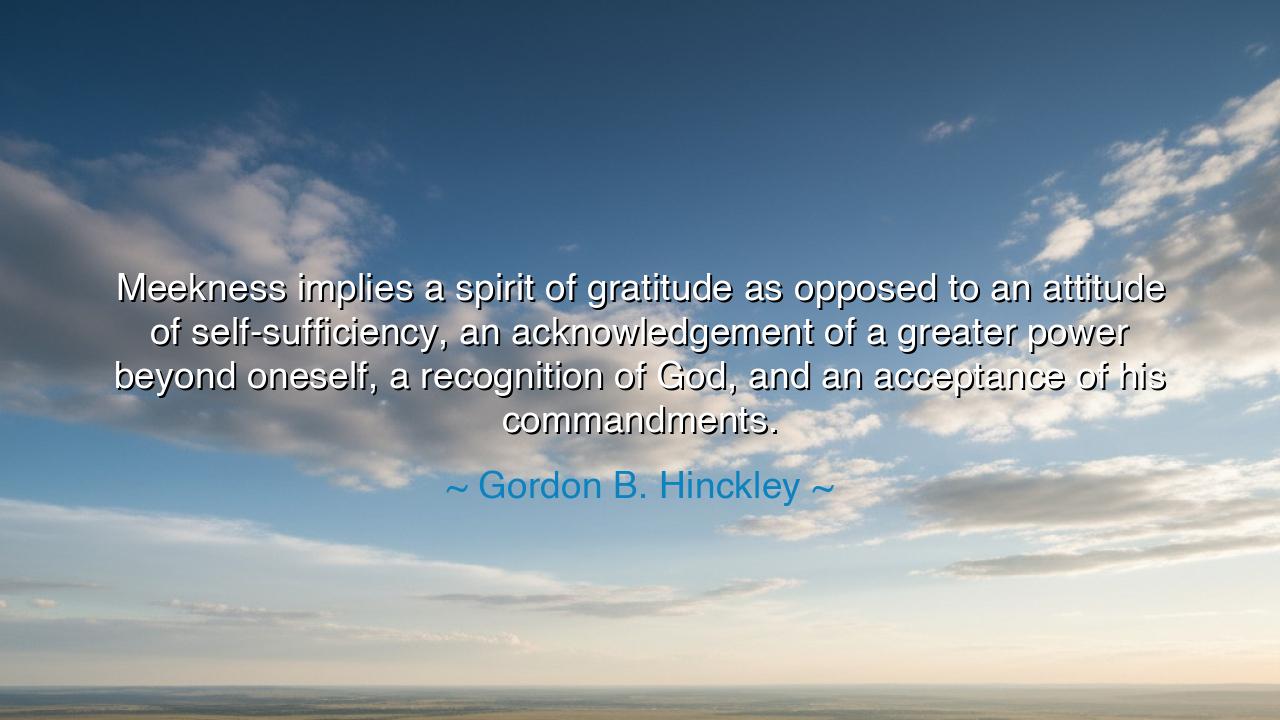
Meekness implies a spirit of gratitude as opposed to an attitude
Meekness implies a spirit of gratitude as opposed to an attitude of self-sufficiency, an acknowledgement of a greater power beyond oneself, a recognition of God, and an acceptance of his commandments.






Host: The gentle hum of the evening filled the room, creating a reflective atmosphere for deeper conversation. Jack sat at the table, his fingers resting lightly on his cup, contemplating Gordon B. Hinckley’s words. Jeeny stood near the window, her gaze directed outward, reflecting on the meaning of the statement.
Jeeny: “I’ve been thinking about what Gordon B. Hinckley said: ‘Meekness implies a spirit of gratitude as opposed to an attitude of self-sufficiency, an acknowledgement of a greater power beyond oneself, a recognition of God, and an acceptance of his commandments.’ It’s such a deep reflection on the concept of meekness, don’t you think? The idea that meekness isn’t weakness—it’s about gratitude, humility, and recognizing that there is something greater than ourselves guiding us.”
Jack: “Yes, exactly. Hinckley is showing us that meekness is not about being passive or powerless—it’s about acknowledging that we are part of something much bigger. Meekness is a form of strength that comes from humility and a sense of gratitude. It’s not about self-sufficiency, but recognizing that we don’t have all the answers on our own, and that there is a higher power we are connected to.”
Jeeny: “Right. And I think it’s interesting how Hinckley frames meekness as an attitude of gratitude, not just a lack of pride or arrogance. It’s about being grateful for what we have, for the guidance we receive, and recognizing that there’s a greater purpose than just our own individual goals. Meekness, in this sense, is more of an open-hearted acknowledgment that we are not in control of everything.”
Host: The stillness in the room grew deeper as they reflected on the concept of meekness. Jack’s fingers rested on the table, while Jeeny’s expression softened, considering how meekness is about aligning oneself with something greater than the self—humbling oneself in the process.
Jack: “It makes me think about how often we focus on self-sufficiency—the idea that we need to have it all together on our own, that we have to be completely independent. But Hinckley is reminding us that meekness is the opposite. It’s not about rejecting self-sufficiency entirely, but understanding that true strength comes from acknowledging that we need help, that we need to recognize the guidance and commandments from a higher power.”
Jeeny: “Exactly. And I think Hinckley is showing us that meekness is actually a form of acceptance—accepting that we are not the center of the universe, that there is something much greater than us that deserves our respect and obedience. Meekness comes from a place of humility, where we recognize our place in the world and are willing to surrender to that greater power.”
Jack: “And I think that’s what makes meekness so powerful. It’s not about weakness; it’s about a strong inner resolve to accept guidance and live with gratitude. It’s a reminder that sometimes the most powerful thing we can do is to be open to what is beyond our control, to accept that there is wisdom in following a higher power, and in doing so, we find peace.”
Jeeny: “Yes, and Hinckley also highlights the connection between meekness and gratitude. When we approach life with a sense of gratitude, it opens us up to the possibility of learning and growing in ways we might otherwise resist. We recognize that everything isn’t solely up to us, that we are part of a larger picture. Meekness, in this sense, is about having the grace to accept what we cannot change and be thankful for the opportunity to learn from it.”
Host: The quiet in the room deepened as they reflected on the profound nature of meekness. Gordon B. Hinckley had shown them that true meekness is about humility, gratitude, and acceptance—recognizing that there is a greater power than ourselves guiding us. Jack leaned back slightly in his chair, while Jeeny’s gaze turned from the window back to him, both of them understanding the depth of Hinckley’s words.
Jack: “So, Hinckley is really showing us that meekness isn’t about being passive or submissive—it’s about humility, gratitude, and acknowledging that we don’t have to do everything on our own. True strength comes from recognizing the greater power at work and being open to guidance.”
Jeeny: “Exactly. Hinckley reminds us that meekness is a strength—the strength to recognize that there is something greater than ourselves and to live in harmony with it. It’s not about rejecting independence, but understanding that true wisdom comes from acknowledging our place in the world and being grateful for the guidance we receive.”
Host: The evening had fully settled in, the quiet understanding between them a reminder that meekness is not weakness but a powerful form of strength rooted in humility, gratitude, and acceptance. Gordon B. Hinckley had shown them that true meekness comes from recognizing a higher power and living in alignment with it. The world outside had darkened, but inside, there was light—a recognition that humility and gratitude are the foundations of a fulfilled and meaningful life.






AAdministratorAdministrator
Welcome, honored guests. Please leave a comment, we will respond soon